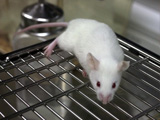|
|
TODAY.AZ / Weird / Interesting
Bacteria in gut influence brains of mice, soothed by probiotic broth
31 August 2011 [10:48] - TODAY.AZ
 Anyone who has ever had a stomach bug knows it can really subdue your spirits as well as your appetite. But other parts of the gut microbiome can have the opposite effect, and make you feel great. Irish researchers have found a type of gut bacteria that seems to have directly interacted with the brains of mice, reducing stress and depression.
Anyone who has ever had a stomach bug knows it can really subdue your spirits as well as your appetite. But other parts of the gut microbiome can have the opposite effect, and make you feel great. Irish researchers have found a type of gut bacteria that seems to have directly interacted with the brains of mice, reducing stress and depression.Scientists fed mice a broth containing Lactobacillus rhamnosus, a strain of Lactobacillus species that is found in mouse gastrointestinal systems, and watched the mice’s behavior. They appeared less stressed and depressed than mice who got a plain broth, the researchers reported. When they were placed in water to deliberately stress them out, the L. rhamnosus-fed mice also had lower levels of stress hormones.
John Cryan, a neuroscientist at University College Cork in Ireland, also monitored the animals’ brains to watch for changes. He and colleagues found heightened activity in one of the receptors for a neurotransmitter called GABA, which regulates psychological processes. Certain depression drugs target GABA receptors, ScienceNow points out. Cryan and his colleagues found that certain portions of the neurotransmitter that are normally reduced during depression were more highly expressed in the L. rhamnosus mice. And other areas that are increased during depression were less pronounced in the L. rhamnosus mice.
To prove there really was a connection between the stomach bacteria and GABA activity, the researchers got new mice and cut the nerve that allows the gastrointestinal tract to communicate with the central nervous system. Then they fed these mice the broth, and the GABA receptors and mouse behavior remained at normal, pre-bacteria-enhanced levels.
This is not the first study to examine a connection between gut bacteria and psychological/brain physiological changes. Last summer, a British study found that the urine of autistic children has a distinct chemical signature associated with gut bacteria. Researchers at Imperial College London were not sure whether the bacteria were producing some kind of metabolic byproducts that could contribute to autism.
The Irish researchers say they still want to determine how the bacteria interact with the GABA receptors.
The chose L. rhamnosus because they happened to have it handy, and because related Lactobacillus species are so common in “probiotic” food supplements, ScienceNow reports. The bacteria is used to make foods like sourdough bread, yogurt and cheese. The paper was reported in the Proceedings of the National Academy of Sciences.
/Popular Science/
URL: http://www.today.az/news/interesting/93416.html
 Print version
Print version
Views: 1736
Connect with us. Get latest news and updates.
See Also
- 05 February 2025 [19:41]
Japan plans to negotiate with Trump to increase LNG imports from United States - 23 January 2025 [23:20]
Dubai once again named cleanest city in the world - 06 December 2024 [22:20]
Are scented candles harmful to health? - 23 November 2024 [14:11]
Magnitude 4.5 earthquake hits Azerbaijan's Lachin - 20 November 2024 [23:30]
Launch vehicle with prototype of Starship made its sixth test flight - 27 October 2024 [09:00]
Fuel prices expected to rise in Sweden - 24 October 2024 [19:14]
Turkiye strikes terror targets in Iraq and Syria - 23 October 2024 [23:46]
Kazakhstan supplied almost entire volume of oil planned for 2024 to Germany in 9 months - 23 October 2024 [22:17]
Taiwan reported passage of Chinese Navy aircraft carrier near island - 23 October 2024 [21:50]
Russia remains largest oil supplier to India
Most Popular
 Pashinyan signed up for a ChatGPT course
Pashinyan signed up for a ChatGPT course
 Mono-Armenia what tales did Pashinyan tell in Washington
Mono-Armenia what tales did Pashinyan tell in Washington
 Ruins of an Azerbaijani mosque are being desecrated in Yerevan
Ruins of an Azerbaijani mosque are being desecrated in Yerevan
 Turkiye’s President Erdo?an approves migration cooperation agreement with Azerbaijan
Turkiye’s President Erdo?an approves migration cooperation agreement with Azerbaijan
 Azerbaijan bans entry of Russian MP over offensive remarks
Azerbaijan bans entry of Russian MP over offensive remarks
 Armenians are preparing for a "crusade" against Baku – hopes for the United States
Armenians are preparing for a "crusade" against Baku – hopes for the United States
 Azerbaijan’s fire safety service reviews 2024 successes and prepares for 2025
Azerbaijan’s fire safety service reviews 2024 successes and prepares for 2025
